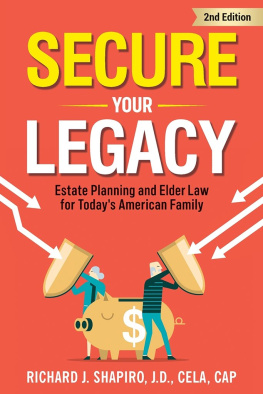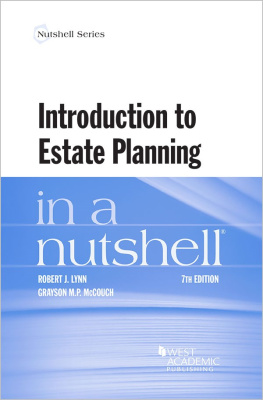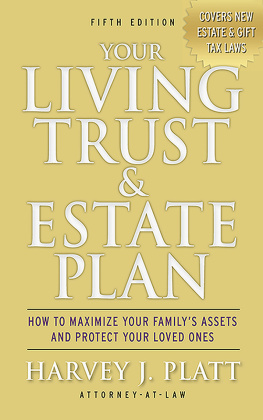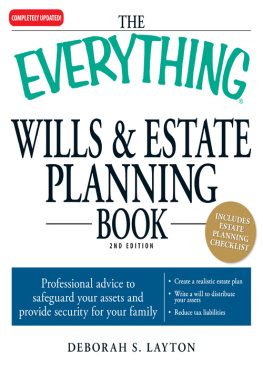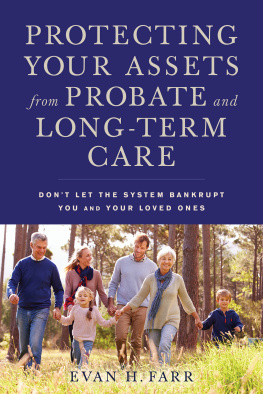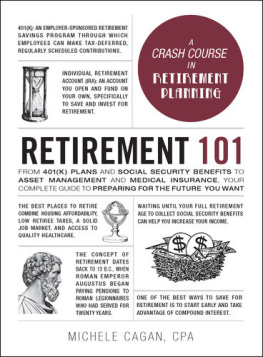
For Terri, Emily, and Aaron,
who inspire me everyday
Table of Contents
Acknowledgments
Forging a successful career requires the support of many people, and I am blessed to have a wonderful family and a great team at my law firm. My wife, Terri, and children, Emily and Aaron, are a source of endless love and inspiration. My colleagues and staff at Blustein, Shapiro, Frank & Barone, LLP have provided me with a platform to hone my skills and craft for over 20 years, and I especially thank my past and current partners Michael Blustein, Tad Barone, Will Frank, Jay Myrow, Rita Rich, Diana Puglisi, and Megan Conroy for giving me the freedom to build an estate planning and elder law department that is second to none.
I have had wonderful mentors since being admitted to the bar more than three decades ago. Burt Blustein, who recently passed away, provided sage guidance for building and managing a law firm, and was one of the most outstanding attorneys we have seen in the Hudson Valley. And my father, Art Shapiro, inspired me to follow in his footsteps to go into the law. I was lucky to practice with him for a decade, and he taught me to go above and beyond in service to my clients. He showed me the good lawyers can do for society, and I am forever grateful for the example he set.
My later mother, Harriet, also instilled in me a love of the English language that has helped my writing throughout my career.
Kudos too to my phenomenal estate planning and elder law team, including attorney Megan Conroy, recent law school graduate Mehvish Maqbool, and our assistants, Donna Wood, Lauren Dillon, and Sara Bennaci, who are unfailingly patient and are so vital to our success.
Preface
When this book was first published in 2017, it fulfilled my long-desired goal of providing the public with an easy-to-read resource for understanding the most common issues in estate planning and elder law. These topics can be complicated, and all too often people rely on what I call Marge from the coffee shop advice in making what can be life-altering decisions about how to plan their estate and protect their assets.
Much has changed in the world of estate planning and elder law in the five years since the first edition was released. This revised edition provides up-to-date information about new laws and new planning strategies and incorporates some new topics that were not included in the prior edition. This revised edition also includes the current (as of 2022) estate and gift tax exemption amounts; a review of the SECURE Act, which has changed the landscape of planning with retirement assets; and other legal updates, including a major reboot of New Yorks statutory Power of Attorney statute.
While I am licensed to practice in both New York and Pennsylvania and am on inactive status with the District of Columbia Bar, most of my clients and cases are based in New York. While I have attempted to often integrate national perspectives in describing the various issues described in the book, readers will note that most examples and cases cited are based on New York law, and I make no assurance that the information will apply in every jurisdiction. And, being the dutiful lawyer I am, here is this routine disclaimer: The information in this book is for general information only and is not, nor is it intended to be, legal advice.
As you go through the chapters, a continuous theme will become readily apparent: creating a successful estate plan doesnt happen by luck but requires the involvement of a well-qualified estate planning attorney. There will be both a time and financial commitment to doing it right, but isnt your familyand preserving your legacyworth it?
Richard J. Shapiro, J.D., CELA, CAP
June 2022
PART I: ESTATE PLANNING BASICS
Chapter 1 - Why Do I Need to Have an Estate Plan?
Estate Planning Fundamentals
Many people erroneously believe that tax avoidance is the only reason to do estate planning, and therefore only the wealthy need to establish an estate plan beyond a basic last will and testament. But even for people of more modest means, a well-conceived estate plan is a must. Estate planning is more than just tax planning. Estate planning allows you to:
Plan for your own mental incapacity so you need not rely on the courts to choose who will take care of you and your needs if you cannot manage your personal and financial affairs.
Designate those persons who will make health care decisions for you upon your incapacity.
Set your own preferences for life-support procedures.
Retain control of how your assets are distributed upon your death.
Ensure that your assets are protected if you need long-term care.
In short, through various estate planning tools, you can ensure that your assets will go to your chosen beneficiaries when you want and the way you want.
But too often the planning professionals hinder effective estate planning. If you put an estate planning attorney, CPA, life insurance agent, and financial advisor in one room, what issue do you think they are most likely to discuss? If you said taxes, you are probably right. As professionals, our training leads us to explore the most complex and challenging aspects of our respective fields. Given the complexity of our tax system, and the significant depletion taxes can cause to a familys assets, its no surprise that estate planning professionals devote so much time and effort to learn the latest tax-saving strategies.
Unfortunately, this tax-centric focus often leads to the conclusion that the success of an estate plan is determined solely by the inclusion of estate-tax reduction language. Too often, such a narrow focus obscures the real reasons clients are seeking assistance, which is to provide for personal planning goals beyond mere tax planning.
During the counseling process, we must have a thorough understanding of the other family members and the overall family dynamics. Each family has its own quirks and issues, and it is essential that the client, as the expert on family matters, educates the estate planning attorney about the family situation. Once the attorney has gained a thorough understanding of the family picture, he or she can then teach the client about the estate planning techniques and the law most applicable to that clients situation. Only by combining these different sources of expertise can the client and attorney together create a customized estate plan suitable for that clients needs.
After understanding the familys particular dynamics and needs, we can then focus on the clients wealth. Experience shows us that our clients want to first preserve and protect their accumulated wealth, and then they wish to look at ways to enhance their wealth.
Finally, we address the strategies and tools to save taxes and administrative expenses. Like the last piece of a puzzle, this is the easiest piece to completebut only if all the appropriate groundwork has been laid.
By focusing first on the familys personal planning goals and concernsissues which, in traditional estate planning, are often relegated to the back burnerwe can create an estate plan that is family-centric, as opposed to tax-centric. Its not a case of ignoring tax planning; rather, tax planning needs should be properly evaluated

